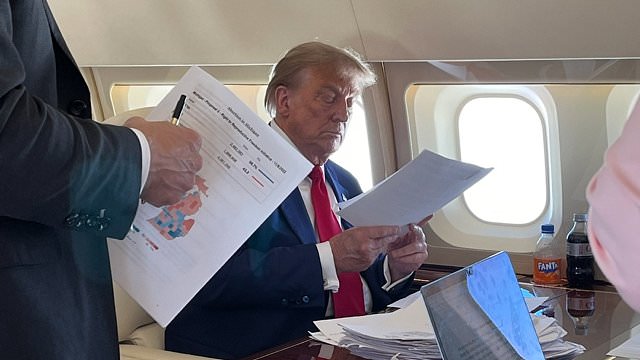New details about the chart that saved Donald Trump’s life in Butler, Pennsylvania, were revealed on Wednesday, according to the author of the chart.
Sen. Ron Johnson of Wisconsin revealed that April 2, 2024 was the date he delivered his chart on illegal immigration to Trump, while traveling aboard his campaign airplane.
‘Today is the 1-year anniversary of the day I gave POTUS my immigration chart on Trump Force One,’ Johnson wrote on social media on Wednesday.
Johnson shared an image of Trump looking at the chart that showed a dramatic spike in the numbers of illegal immigrants entering the United States under former President Joe Biden’s administration in contrast from his first term as president.
‘I’m glad it came in handy,’ Johnson wrote. ‘God works in mysterious ways.’
Johnson said in a 2024 interview that hocking chart instantly caught the president’s attention and sent it to his communications team for campaign use.
‘It’s obvious what the Biden administration has done in that chart. It shows what Trump had to deal with and how he successfully dealt with it,’ Johnson said.
‘And then it shows just the explosion of illegal immigration under President Biden and Vice President Harris,’ he added.
Trump famously credited the chart for saving his life, after he turned to look at it during a campaign rally in Butler, Pennsylvania that fateful day on July 13 as would-be assassin Thomas Crooks fired eight rounds at him from the rooftop of a nearby building.
The president turned his head to look at the chart just as the bullets wizzed by his head.
He was struck just once by a bullet in his ear before the shooter was taken out by law enforcement counter-snipers.
Trump later described the chart as his ‘all time favorite chart in history’ in subsequent campaign events.
‘I love that chart. I sleep with that chart, every night I kiss it. I love it, because that chart saved my life,’ he said at a September campaign rally in Georgia.
At the time, Trump admitted that he did not always use the chart at his campaign rallies and even when he did it was usually at the end of his speeches.
But for some reason, he referred to the chart that day in Butlershortly after he took the stage.
‘I looked to the right, bing. If I didn’t look to the right, I wouldn’t be here with you today, I guarantee you that,’ he said.
